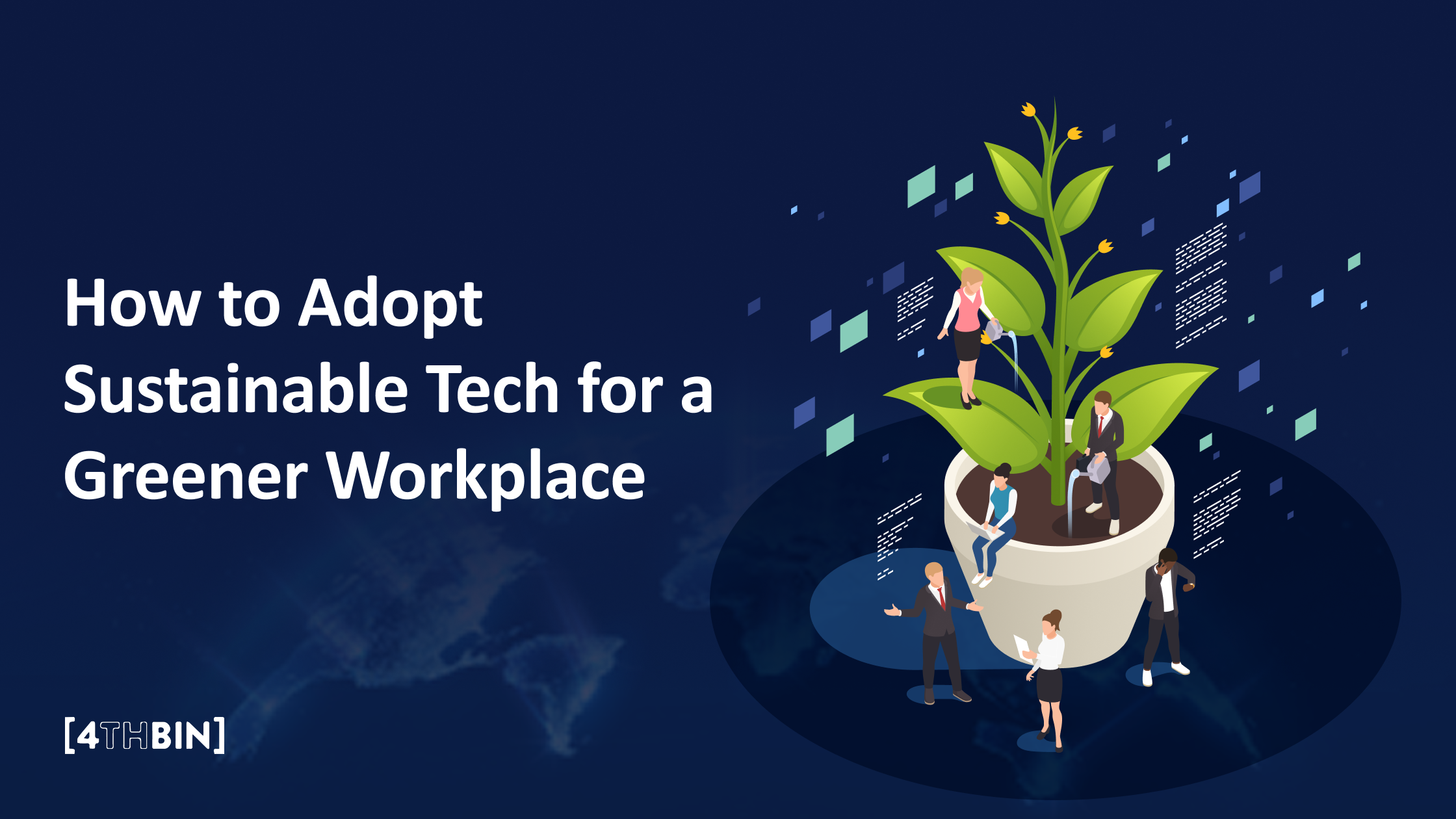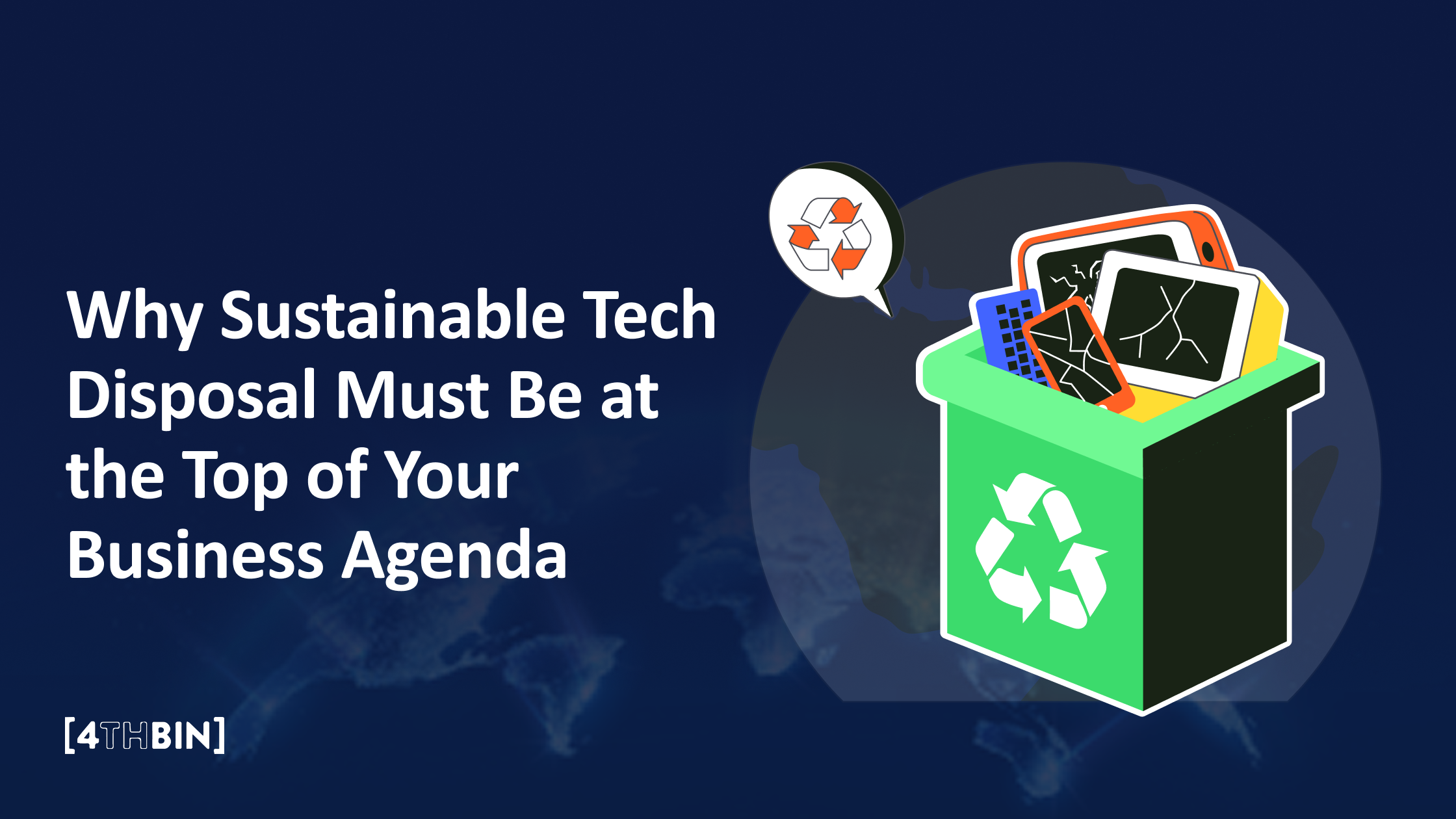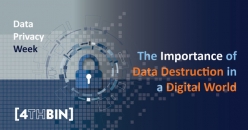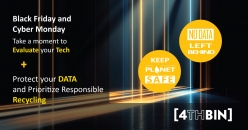The Future of E-Waste Recycling: Trends and Predictions
When your organization upgrades its technology, do you know where the old electronics go? Unfortunately, most discarded corporate electronics don’t end up in sustainable recycling systems. Instead, they contribute to the global e-waste crisis, which is expected to reach 82 million tonnes in 2030.
This growing challenge goes beyond being an environmental issue, highlighting the urgent need for change. Discarded electronics hold valuable materials that can be recovered and repurposed, offering opportunities for smarter, more sustainable solutions. The future of e-waste recycling lies in innovation, responsibility, and reimagining outdated technology as a valuable resource for a greener planet.
In this blog, we will explore the future of e-waste recycling and trends and predictions that pave the way for a more sustainable world. We can ensure that yesterday’s e-waste becomes tomorrow’s resources, creating a lasting positive impact for future generations.
E-Waste Recycling: Trends and Predictions for 2025
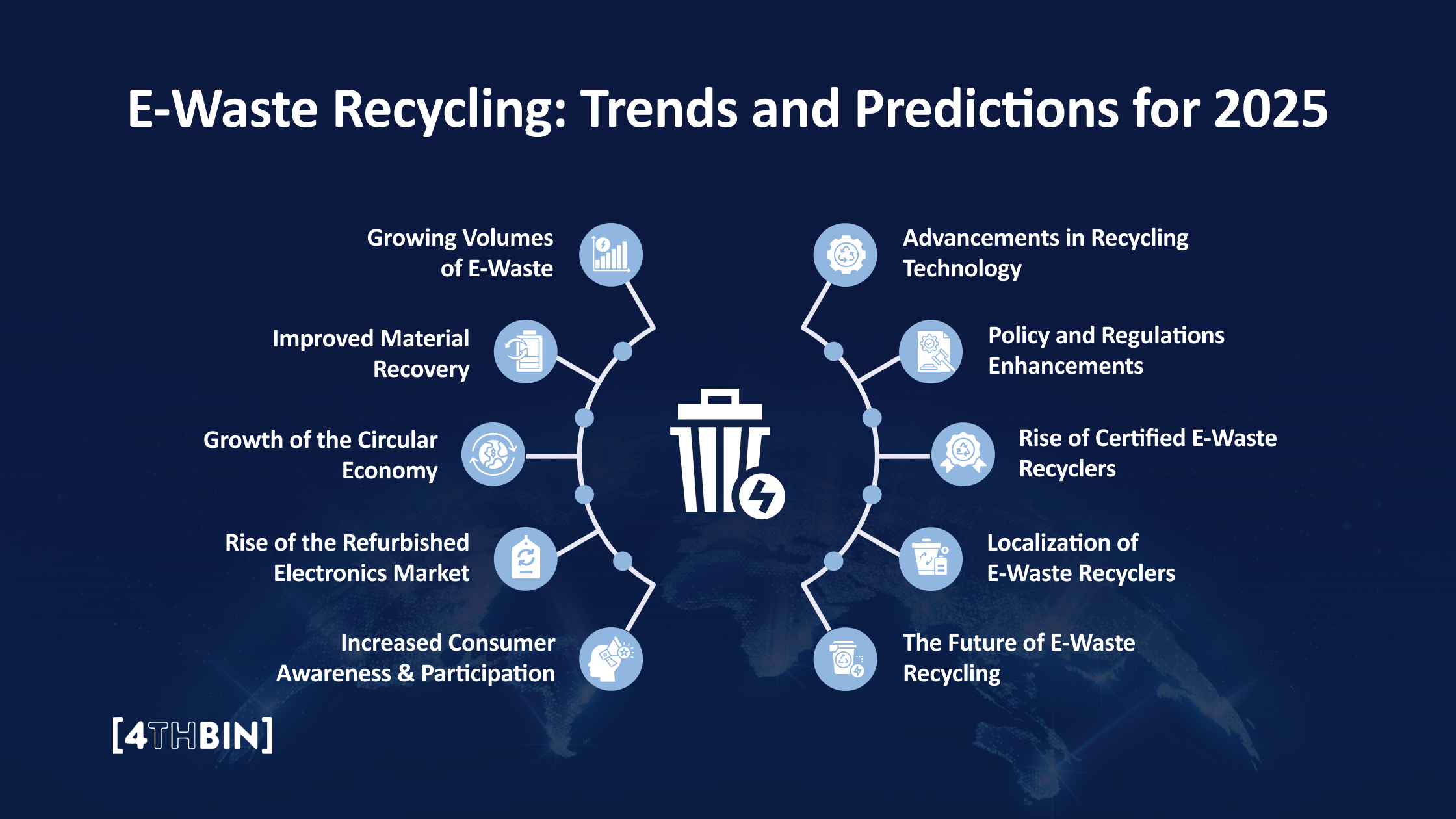
E-waste recycling is undergoing a significant transformation as technology advances, regulations become stricter, and global awareness grows. Here are a few e-waste recycling trends and predictions for 2025:
Growing Volumes of E-Waste
The amount of e-waste generated worldwide is increasing at an alarming pace, driven by rapid technological advancements, shorter product lifespans, and our growing demand for the latest gadgets. In 2022 alone, the world generated an estimated 62 million tonnes of e-waste, expected to rise by 32% to reach 82 million tonnes by 2030.
E-waste contains hazardous substances like lead, mercury, and cadmium, which pose significant environmental and health risks when improperly disposed of. However, it also holds immense potential for resource recovery, with valuable materials such as gold, silver, copper, and rare earth elements embedded in discarded devices.
The growing volume of e-waste emphasizes the urgent need for innovative and efficient recycling systems to prevent hazardous materials from entering landfills. These systems must prioritize safe handling, maximize material recovery, and reduce the environmental impact of discarded electronics, transforming e-waste from a liability into an opportunity.
Improved Material Recovery
In 2022, about 12 million tonnes of metals were lost due to improper disposal of e-waste. The future of e-waste recycling depends on improving how we recover valuable materials from discarded electronics. Devices like smartphones, laptops, and batteries contain precious metals like gold, silver, and palladium, as well as critical materials such as lithium and rare earth elements. These resources are essential for manufacturing new electronics.
However, conventional recycling methods often fall short, recovering only a fraction of these valuable materials while generating significant waste. Emerging technologies are now stepping up to address these shortcomings.
Advanced processes like chemical leaching, bio-mining using microbes, and AI-powered sorting systems are being developed to extract materials more efficiently and with less environmental harm. As these innovations gain traction, they promise to make recycling more effective and reduce the need for environmentally destructive mining practices.
Growth of the Circular Economy
A significant shift toward a circular economy reshapes the e-waste sector's operations. Unlike the traditional “take-make-waste” model, a circular economy emphasizes extending product lifecycles through repair, refurbishment, and recycling. Companies are now developing electronics with recyclability in mind, using modular designs and easily separable materials.
This approach reduces the waste generated and conserves valuable resources like metals and rare earth elements, which are critical for manufacturing new electronics. Businesses are also embracing innovative models such as leasing and product-as-a-service systems, where customers use devices for a period, and the company retains ownership to facilitate refurbishment or recycling.
Additionally, collaborations between manufacturers, retailers, and recyclers are emerging to create more efficient take-back programs and promote shared responsibility across the product lifecycle. These efforts are gradually transforming e-waste from an environmental challenge into a resource for sustainable growth, demonstrating how a circular economy can drive economic and ecological benefits.
Rise of the Refurbished Electronics Market
The refurbished electronics market is booming as consumers become more cost-conscious and environmentally aware. Buying pre-owned, refurbished devices saves money and helps reduce the demand for new electronics, which cuts down on resource extraction and the amount of e-waste generated.
These refurbished products are often thoroughly inspected, repaired, and certified, ensuring they meet high quality and performance standards. As a result, brands and third-party providers increasingly offer certified refurbished products, creating a trusted and reliable market for consumers. This trend is expected to grow, especially as younger, eco-conscious consumers seek affordable, sustainable options.
Additionally, the rise of online platforms and marketplaces dedicated to refurbished products is making it easier than ever for people to find quality, affordable electronics. This shift supports sustainability and encourages a more conscious approach to consumption, where products are valued for longer lifespans and reused rather than discarded.
Increased Consumer Awareness & Participation
Only about 44% of consumers try to recycle their electronics internationally, and 31% either throw away old electronics with their household garbage or mix them in with other recyclables. These figures showcase how increased consumer awareness about e-waste is crucial in promoting responsible recycling practices.
While public campaigns, educational programs, and community outreach are helping people understand the environmental and health risks associated with improper disposal of electronic waste, this is not enough, as only 58% say they’re aware of specialist recycling centers in their neighborhood.
However, this trend is about to change, with consumers becoming more conscious of their purchases. With increased awareness, consumers will take action, such as returning old devices to designated recycling centers, engaging in buy-back programs, or recycling their electronics to recover valuable resources. As awareness grows, overall participation in e-waste recycling is expected to increase, and we may see more innovative recycling solutions and incentives to help bridge the gap in consumer engagement.
Advancements in Recycling Technology
Innovative recycling technology is transforming the management of e-waste. Robotics and AI-powered sorting systems have significantly improved the separation of valuable materials from electronic waste.
Advanced chemical processes also contribute to e-waste recycling. Companies have developed a facility capable of processing 4,000 tonnes of circuit boards annually, extracting up to half a tonne of gold, 1,000 tonnes of copper, 2.5 tonnes of silver, and 50 kg of palladium.
Decentralized recycling units, or micro-factories, are emerging as a solution for local e-waste management. These facilities can be integrated into existing manufacturing businesses to recycle available waste, reduce transportation emissions, and promote sustainability.
As technology advances, the recycling industry is becoming more adept at handling the increasing volume and complexity of e-waste. Integrating innovative recycling technologies enhances material recovery and contributes to environmental sustainability by reducing the ecological footprint of e-waste processing.
Policy and Regulations Enhancements
Policy and regulations are critical in shaping the future of e-waste recycling. Governments worldwide are adopting stricter laws to address e-waste management. These include Extended Producer Responsibility (EPR) policies, which require manufacturers to manage the entire lifecycle of their products, including end-of-life disposal. This approach incentivizes eco-friendly product designs and enhances recycling efforts.
Import or export regulations are also being tightened to prevent the dumping of e-waste in developing countries. Collaborative global efforts, such as the Basel Convention, aim to ensure e-waste is managed sustainably. These regulatory frameworks incentivize innovation in recycling technology, encourage the circular economy, and protect human health and the environment.
Policy and regulatory frameworks are pivotal in shaping the future of e-waste recycling, driving sustainable practices, and safeguarding environmental and public health. Governments worldwide are implementing stringent measures to address the escalating e-waste challenge.
Countries are tightening controls on transboundary movements of electronic waste to prevent the dumping of e-waste in developing nations.
The Basel Convention, an international treaty, regulates hazardous waste shipments, including e-waste, ensuring environmentally sound management. Despite these efforts, billions of dollars worth of e-waste are shipped annually, often illegally, from developed to developing countries, highlighting the need for stricter enforcement.
As of 2022, approximately 70% of countries have established e-waste policies, regulations, or legislation. This trend will increase as countries implement more stringent regulations around e-waste disposal. However, effective enforcement and global cooperation remain critical to achieving these goals.
Rise of Certified E-Waste Recyclers
In 2022, 62 million tonnes of e-waste were produced globally, yet only 22.3% was documented as properly collected and recycled. These alarming figures highlight the demand for accountability and transparency in e-waste management, leading to a rise in certified e-waste recyclers.
These organizations adhere to rigorous environmental and safety standards in handling, processing, and recycling electronic waste, ensuring ethical and responsible operations. Certifications such as R2 (Responsible Recycling) and e-Stewards ensure that recyclers operate ethically, responsibly, and in compliance with international laws.
Certified e-waste recyclers, such as 4THBIN, assure businesses and consumers that their discarded electronic devices are managed sustainably and securely. The rise of certified e-waste recyclers aids in promoting sustainable e-waste management practices, ensures environmental protection, and boosts consumer confidence in recycling. As awareness of e-waste issues grows, the segment of certified e-waste recyclers is expected to expand, enhancing trust in the recycling ecosystem.
Localization of E-Waste Recyclers
The globalization of e-waste has often resulted in improper disposal practices, especially in developing countries where inadequate infrastructure leads to significant environmental and health challenges.
Informal recycling methods can release harmful substances, such as neurotoxicants like lead, while illegal exports exacerbate the problem. For instance, Malaysia seized over 100 containers of e-waste in just three months, highlighting the impact of illicit shipments.
There is a growing emphasis on establishing localized e-waste recycling systems to address these issues. By establishing regional recycling centers, countries can minimize illegal exports, reduce the carbon footprint of transporting waste, and ensure proper processing.
These localized systems also promote economic opportunities by creating jobs and stimulating local economies. Additionally, localized recycling strengthens community participation in sustainable practices, enabling greater environmental stewardship.
The Future of E-Waste Recycling
The future of e-waste recycling is promising, with innovative solutions and global awareness paving the way for a more sustainable approach to managing our discarded electronics.
However, achieving meaningful change requires a collaborative approach. Governments must continue to enforce strict regulations and invest in recycling infrastructure. Businesses must develop products with sustainability in mind and actively participate in recycling programs. At the same time, individuals play a crucial role by properly disposing of their e-waste and choosing refurbished or eco-friendly electronics.
Only through combined efforts can we mitigate the environmental and health risks of e-waste and ensure a cleaner, greener future for the planet.
Transform Your E-Waste Management with 4THBIN
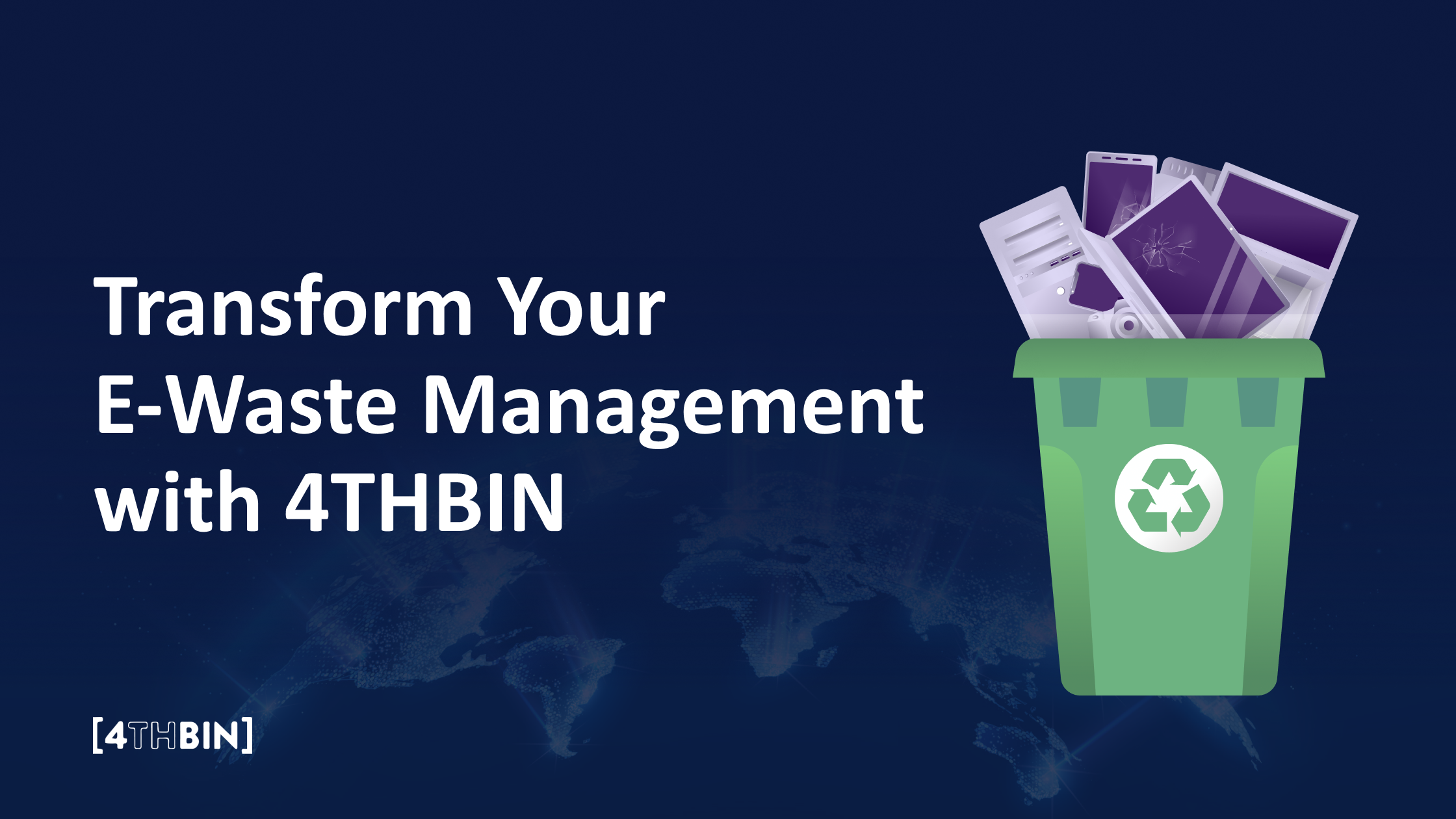
The future of e-waste recycling is here. With 4THBIN’s certified e-recycling solutions, you can ensure safe, secure, and eco-friendly disposal of your organization’s e-waste.
With over a decade of expertise, 4THBIN has partnered with over 10,000 organizations across the United States, including Fortune 100 companies and startups, to transform e-waste into a valuable resource.
We prioritize data security and environmental impact, ensuring that sensitive information is completely safeguarded with our certified data destruction services. This eliminates the risks of data recovery associated with improper disposal.
Our customizable e-waste recycling solutions include secure RemoteReturn mail-in services and convenient on-site collection options, allowing you to choose a plan that best fits your organization’s needs.
Embrace the Future of E-Waste Recycling


